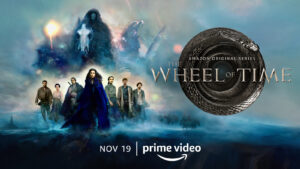This month has been our version of “200 channels and nothing to watch!” None of the movies that hit the theaters this month seemed to tickle our fancy, and the two possibilities we settled on were both deemed inappropriate after the fact. So, this April, we will go with a more general topic to discuss what we’ve been watching. So without further ado…
Reacher (Amazon Prime)
 One series that Eve and I both enjoyed was Reacher on Amazon Prime Video. Based on the Jack Reacher character as created by Lee Child. Renewed for a second season less than a week from its initial release, Reacher follows the life of the retired U. S. Army military police officer who has taken up a nomadic lifestyle. Traveling from place to place by bus, he finds himself in Margrave, Georgia, ostensibly to visit the birthplace of an obscure jazz musician. Unfortunately, he’s not there ten minutes before he is arrested for a murder he couldn’t have done. From there, things only go downhill—for the bad guys. When Jack Reacher gets involved and says he will burn [the criminal enterprise] to the ground, he’s not just whistling Dixie.
One series that Eve and I both enjoyed was Reacher on Amazon Prime Video. Based on the Jack Reacher character as created by Lee Child. Renewed for a second season less than a week from its initial release, Reacher follows the life of the retired U. S. Army military police officer who has taken up a nomadic lifestyle. Traveling from place to place by bus, he finds himself in Margrave, Georgia, ostensibly to visit the birthplace of an obscure jazz musician. Unfortunately, he’s not there ten minutes before he is arrested for a murder he couldn’t have done. From there, things only go downhill—for the bad guys. When Jack Reacher gets involved and says he will burn [the criminal enterprise] to the ground, he’s not just whistling Dixie.
The story was engaging, and the dialog was well written. The acting was good. Most of the scenes are standard fare for the genre, but there are several instances of graphic nudity and violence. It might be enough to tip the scales against it for many viewers. However, the objectionable material didn’t detract from the story and even served the plot in our assessment. We could have done without, though. For more details on the content of the Amazon Prime series, check out the Plugged-In review of Reacher.
A Wolf in Sheep’s Clothing
One of the main themes in Reacher was questioning who was and was not trustworthy. The creative team plays it close to the chest regarding all the players’ motivations and loyalties, saving many of the reveals for late in the game. It serves to remind us that we cannot judge the hearts of those around us. Only God can do that. We depend on the discernment of the Spirit and the test of Scripture. We have to examine the fruits of the spirit—and adjust accordingly:
A good tree doesn’t produce bad fruit; on the other hand, a bad tree doesn’t produce good fruit. For each tree is known by its own fruit. Figs aren’t gathered from thornbushes, or grapes picked from a bramble bush. (Luke 6:43-44)
Of course, it takes time to see the fruit that bears, and for that, we depend on that discernment of the Spirit. We can take the advice of Scripture when evaluating people. One piece of advice recommends we look at the company others keep to consider their character:
Do not be deceived: “Bad company corrupts good morals.” (1 Corinthians 15:33)
If someone who holds himself out to be a moral person is attended to by others who are not honest people, it is safe to assume that the entire cadre is corrupt.
This does not imply that godly people should not associate with sinners—far from it. But we must acknowledge that there is a difference between an actively witnessing friendship and a friend who you are not actively witnessing to.
Total Self-Dependence
It’s common in this genre that a protagonist is a self-made man (or woman) who depends on no one but themselves. Perhaps they are haunted by a bad relationship or circumstance in the past, or their personality quirks make them difficult to be around. That got us wondering, should we view this as an admirable trait?
If I speak human or angelic tongues but do not have love, I am a noisy gong or a clanging cymbal. If I have the gift of prophecy and understand all mysteries and all knowledge, and if I have all faith so that I can move mountains but do not have love, I am nothing. (1 Corinthians 13:1-2)
When we look at these characters and consider the fruits of the Spirit as outlined in Galatians 5, we might consider these fruits and evaluate the characters based on them. We’re not usually going to get godly protagonists, but we need to make sure we don’t admire or seek to emulate the characteristics of the good guys just because they are presented to us as just that—the good guys. In the case of Reacher, he has a lot of good things going for him.
Reacher was an exciting show that we can recommend—if you can stomach the occasional distasteful content.
The Wheel of Time (Amazon Prime)
 Fantasy series based on a Robert Jordan book series, which neither of us has read. Five young people from a mountain village join a sorceress and her bodyguard on a journey to a magical city. One of them might be a foretold dragon reborn who will either save the world or destroy it. Some want to capture this dragon; some want to kill them. The world contains female sorceresses who believe that only women can hold power, a group of people who believe in strict purity (who burn the “sorceresses”), travelers who believe in complete nonviolence, an abandoned city whose shadows eat people, and other fantastical obstacles.
Fantasy series based on a Robert Jordan book series, which neither of us has read. Five young people from a mountain village join a sorceress and her bodyguard on a journey to a magical city. One of them might be a foretold dragon reborn who will either save the world or destroy it. Some want to capture this dragon; some want to kill them. The world contains female sorceresses who believe that only women can hold power, a group of people who believe in strict purity (who burn the “sorceresses”), travelers who believe in complete nonviolence, an abandoned city whose shadows eat people, and other fantastical obstacles.
In the way that Hollywood is like to do in today’s environment, the Amazon series departs from the source material to add a socially acceptable level of diversity in race and gender. Thankfully, that does not have any severe impact on the enjoyment of the story. A little less benign is the inclusion of polyamorous relationships and typical homo- and bi-sexuality. I don’t know if that is reflected in any books, though. Maybe it was as the author intended. Nevertheless, I still found it distasteful.
The basis of the story is how men and women used to have access to a complementary balance of magical power—men with one side, women with the other. In the history of the world, though, the dragon intentionally corrupted the male side of the magic. As a result, any man who attempts to wield magic will go insane.
Like so many fantasy stories, the Wheel of Time also includes a sizeable religious movement with zealous followers who seek to convert or eliminate opponents through vicious persecution. This is frustrating for us as Christians for two reasons: First, real-world history is littered with stories of so-called Christians who conducted themselves in this manner. In the crusades, fighters would seek to convert the enemy at sword point before slaughtering them regardless of the choice the foe made. During the Inquisition, the church hunted those who opposed the Catholic church, regardless of the accuracy of their biblical position. Secondly, these stereotypes are antithetical to the teachings of Christ. When we seek to speak the truth in love, we are accused of being like these misguided crusaders rather than permitted to stand on the merit of the Word of God.
The Wheel of Time series includes a Romani-esque people called the Tinkers. The Tinkers are dedicated to a life of nonviolence—one scene where they encounter the inquisition-like group and oppose them by linking arms and protecting their own. As a result, they are severely beaten, but the scene impresses the view of the Tinker’s dedication to the pacifist philosophy.
This type of pacifism is not uncommon among Christians. While a solid scriptural argument can be made for a time of aggression and a time of pacifism, a non-violent position as a Christian will rarely harm your witness. Christ himself knew when violence is right and when it is wrong.
Then Jesus told him, “Put your sword back in its place because all who take up the sword will perish by the sword. Or do you think that I cannot call on my Father, and he will provide me here and now with more than twelve legions of angels? How, then, would the Scriptures be fulfilled that say it must happen this way?” (Matthew 26:52–54)
The Healer (Amazon Prime)
 Thanks to Amazon’s algorithms, this movie popped up in Eve’s “What to Watch Next” list. The Healer is a lower-budget movie about a young man who discovers that he comes from a long line of miracle healers. This healing has some caveats: It only works in this one town in Nova Scotia, and it must be embraced or rejected on the man’s 30th birthday. Alec Bailey is no ordinary man, though. Maybe he is. He is a selfish swindler who wants nothing to do with altruism. He’s been “burned” by God before when his twin brother died of cancer and has no interest in helping anyone but himself. So when the time comes, he rejects the gift. Then along comes Abigail, a 14-year-old with terminal cancer. Alec develops a brotherly relationship with her and decides that he made a mistake in giving up the gift. The movie wraps up with him cursing God and demanding that he get the gift back, which works.
Thanks to Amazon’s algorithms, this movie popped up in Eve’s “What to Watch Next” list. The Healer is a lower-budget movie about a young man who discovers that he comes from a long line of miracle healers. This healing has some caveats: It only works in this one town in Nova Scotia, and it must be embraced or rejected on the man’s 30th birthday. Alec Bailey is no ordinary man, though. Maybe he is. He is a selfish swindler who wants nothing to do with altruism. He’s been “burned” by God before when his twin brother died of cancer and has no interest in helping anyone but himself. So when the time comes, he rejects the gift. Then along comes Abigail, a 14-year-old with terminal cancer. Alec develops a brotherly relationship with her and decides that he made a mistake in giving up the gift. The movie wraps up with him cursing God and demanding that he get the gift back, which works.
Both Eve and I thought it looked like a cute movie with a heart. Unfortunately, it was a frustratingly shallow movie with one glaring theological error that neither of us could get past. The God of The Healer was the servant of man, not the other way around. He was a source of magical power, subjugated by tradition. Not to mention, production values were lacking. The movie was a “cause movie,” made to promote the Paul Newman SeriousFun Children’s Network, a global community of 30 camps and programs for seriously ill children.
This movie was made with a Christian element, but not by anyone who had any fundamental knowledge of what it means to be a Christian or possess spiritual gifts.
Now concerning spiritual gifts: brothers and sisters, I do not want you to be unaware. You know that when you were pagans, you used to be enticed and led astray by mute idols. Therefore I want you to know that no one speaking by the Spirit of God says, “Jesus is cursed,” and no one can say, “Jesus is Lord,” except by the Holy Spirit. Now there are different gifts, but the same Spirit. There are different ministries, but the same Lord. And there are different activities, but the same God works all of them in each person. A manifestation of the Spirit is given to each person for the common good: 8 to one is given a message of wisdom through the Spirit, to another, a message of knowledge by the same Spirit, to another, faith by the same Spirit, to another, gifts of healing by the one Spirit, to another, the performing of miracles, to another, prophecy, to another, distinguishing between spirits, to another, different kinds of tongues, to another, interpretation of tongues. One and the same Spirit is active in all these, distributing to each person as he wills. (1 Corinthians 12:1-11)
Mayday: Air Disaster (Wonder Channel on YouTube)
 Eve has fallen in love with this Canadian series. Each episode reenacts an air disaster (or potential disaster) and follows the NTSB’s investigation and final recommendations for each occurrence. It surprised Eve that there were so many air disasters, but the investigations are pretty fascinating. For example, the one on the Miracle on the Hudson gave a different perspective on Sully’s emergency landing than the movie showed. From amazing landings of damaged planes to midair collisions where no one survived, every investigation finds the cause (even if it takes years and repeated incidents). It is often down to the smallest part and the rarest environment that caused the air disaster. The investigations are reminiscent of the old proverb, “For Want of a Nail.”
Eve has fallen in love with this Canadian series. Each episode reenacts an air disaster (or potential disaster) and follows the NTSB’s investigation and final recommendations for each occurrence. It surprised Eve that there were so many air disasters, but the investigations are pretty fascinating. For example, the one on the Miracle on the Hudson gave a different perspective on Sully’s emergency landing than the movie showed. From amazing landings of damaged planes to midair collisions where no one survived, every investigation finds the cause (even if it takes years and repeated incidents). It is often down to the smallest part and the rarest environment that caused the air disaster. The investigations are reminiscent of the old proverb, “For Want of a Nail.”
When we board a plane, we trust ourselves to the skill and attention of the pilots and the air traffic controllers, the baggage handlers, the aircraft manufacturers, and the maintenance workers, among countless other variables. Yet, even with all these potential points of failure, it is still far riskier to drive a car. What’s more, as Christians, we have faith in a sovereign God. It doesn’t matter if it is a lightning strike, a shark attack, a volcano, or an airplane crash; our God is never caught unawares. But if we repent, even should our physical bodies perish, we will live eternally with our Lord:
At that time, some people came and reported to him about the Galileans whose blood Pilate had mixed with their sacrifices. And he responded to them, “Do you think that these Galileans were more sinful than all the other Galileans because they suffered these things? No, I tell you; but unless you repent, you will all perish as well. Or those eighteen that the tower in Siloam fell on and killed—do you think they were more sinful than all the other people who live in Jerusalem? No, I tell you; but unless you repent, you will all perish as well.” (Luke 13:1-5)
Star Trek (Paramount+)
In the 1980s and 90s, Star Trek was the golden standard for science fiction. This genre allowed it to couch radical social commentary in its stories and get it past the censors by disguising it as moral quandaries for interacting with alien races. Gene Roddenberry once said, “If man is to survive, he will have learned to take a delight in the essential differences between men and between cultures. He will learn that differences in ideas and attitudes are a delight, part of life’s exciting variety, not something to fear.”
For me, the problem this highlights is that many of the progressive platforms, like the LGBTQ+, have gone beyond seeking delight in essential differences and are determined to vilify those who dare to hold to different standards and beliefs. In the most Star Trek renaissance of the last half-decade, the writers have embraced the LGBTQ+ agenda—including the idea that opposition to that message is, at best, backward thinking and, at worst, evil. The Star Trek of today has stepped beyond the vision of Roddenberry and seeks to drive a wedge between those essential differences.
Please support the podcast!

Are You Just Watching? is listener supported. Special thanks to our current patrons: Isaias Santillano, Craig Hardee, Stephen Brown II, David Lefton, and Peter Chapman for their generous support. We can't continue to share critical thinking for the entertained Christian without your financial help, so please head on over to our Patreon page and become one of our supporting patrons!
Share your feedback!
What did you think of what we've been watching? We would like to know, even if just your reactions to the trailer or the topics we shared in this episode. Or what general critical-thinking and entertainment thoughts or questions do you have? Would you like to suggest a movie or TV show for us to give a Christian movie review with critical thinking?
- Comment on the shownotes
- Call (513) 818-2959 to leave a voicemail
- Email feedback@AreYouJustWatching.com (audio files welcome)
- Join our Facebook discussion group.
